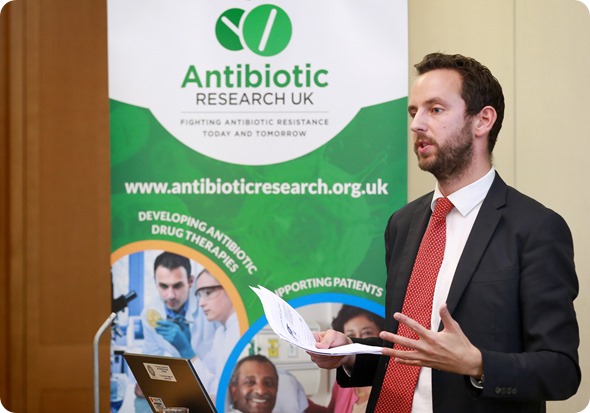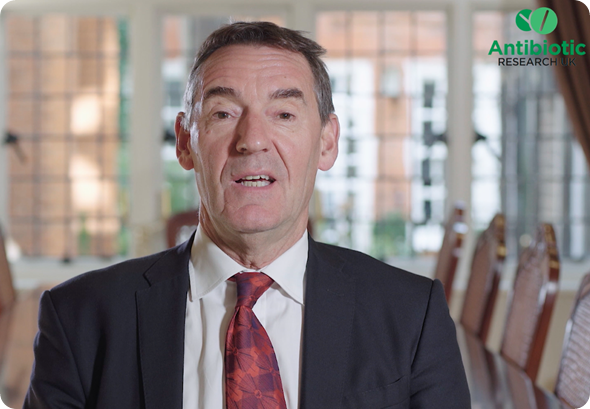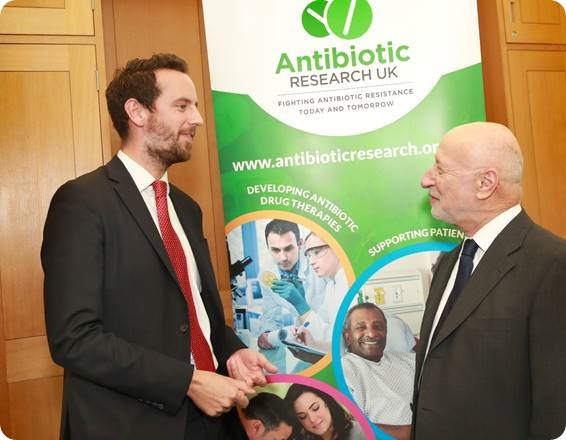Antimicrobial resistance happens when bugs, like bacteria, fungi or viruses, change, or evolve, when they’re exposed to drugs, like antibiotics, antifungals, or antivirals. Bugs that develop antimicrobial resistance are sometimes referred to as ‘superbugs’.
Antibiotic resistance refers specifically to bacteria which have developed resistance to antibiotics.
When we’re talking about antimicrobial resistance it’s important to remember it’s the bug that develops resistance, not the drug. That’s why the term ‘drug resistant infections’ is helpful to use.

How serious is the threat of antimicrobial resistance? What impact could it have?
The exact current and future impact of antimicrobial resistance remains the subject of much debate, but in his report, Jim O'Neill suggested that there are around 700,000 deaths per year now as a result of antimicrobial resistance and that by 2050, there could be as many as 10 million deaths per year.
This is definitely a growing problem and the problem is not just about antimicrobial resistance and the specific infections that arise from that, but also about the impact on infection control.
There's a risk that, in the future, chemotherapy, and routine surgery like cesarean sections and hip replacements will become very high risk, because the growing resistance will mean we won't be able to use antibiotics to prevent and treat infections.
The impact is definitely growing considerably and we see specific problems around, for instance, multidrug-resistant TB across the world.
What’s the difference between gram-positive and gram-negative bacteria in terms of their structure and resistance?
As a very simple explanation, all bacteria have an inner cell membrane, but gram-negative bacteria also have an outer membrane, which is the largely impermeable cell wall. This wall excludes some drugs and antibiotics from entering the cell, which means these gram-negative bacteria, are more resistant to antibiotics than gram-positive bacteria because they have a more effective shield against antibiotics.
What are thought to be the main causes of antimicrobial resistance?
The poor use of antibiotics is a big driver. Antibiotics are prescribed too broadly and for a range of infections that don't need them. Although antimicrobial resistance will occur naturally over time, using antibiotics inappropriately, is speeding up the process. Inappropriate use of antibiotics would include situations where they’re given to people with colds and flu, which are caused by viral infections, not bacteria.
Alongside that, there are issues with poor cleanliness and infection control measures in hospitals that can allow antimicrobial resistant bugs to spread between people.
What about antibiotic use in agriculture?
There is heavy antibiotic use in agriculture, both to control infections, as happens in humans, but also, in some instances, to promote growth in animals. We don't know yet what impact this is having; there isn't a firm and complete scientific consensus on the link between antibiotic resistance in animals and antibiotic resistance in humans. At Wellcome, we're interested in understanding this subject better over time, so we may support others to look into that.
There's a strong consensus that antibiotics are being overused in agriculture and that tackling antibiotic use in agriculture would be a good thing in terms of animal health, and may also have an impact on human health.
How concerned are governments about the threat of antimicrobial resistance? What steps are being put in place to minimise the risk?
I can’t speak for governments, but from what I've seen, I think the UK, firstly, has been a global leader in the conversations about antibiotic resistance and what can be done globally to deal with this problem.
I'd say the UK government has been very concerned and has been leading a global conversation on this. Over many years, the government has taken individual steps to combat antibiotic resistance.
For instance, your readers may recall the deep clean in the mid-noughties, around 2008, that reduced the incidence of MRSA in hospitals and was a big step forward in infection control in hospitals. It made a big difference around the issue of MRSA.
The UK has also more recently been quite aggressive on stewardship of antibiotics. Between 2015 and 2016 there was an 8% reduction in antibiotic prescribing on the NHS. There has been a lot of leadership from our chief medical officer Dame Sally Davies and medical professionals in trying to make sure that antibiotics are only being prescribed where they're needed.
Looking ahead, the government has made a number of undertakings. There has been a pledge to reduce hospital-acquired gram-negative bloodstream infections by 50% by 2020 and also to reduce inappropriate prescribing by 50%, which are measures Wellcome would be very supportive of.
The UK government has also targeted lower levels of antibiotic use in agriculture. The UK has been one of the better performers in the area of agriculture, alongside other EU countries, thanks to some broad EU standards that have been in place for some time, but there's no question we could go further.
Can you please give an overview of the O’Neill Review and the 10 Point Plan?
In his review, Jim O’Neill targeted a wide range of possible measures across both human and animal health, making 10 key recommendations to address resistance. We need better use of existing drugs and we need new drugs. There's been a market failure in antibiotics over the past couple of decades. We've had no new classes of antibiotics since around 1987, so we urgently need to produce new antibiotics, which will also involve looking at how we pay for antibiotics.
As far as new drugs are concerned, we need to look at both the money that is going in to promote innovation and R&D and the money that is then given to people to buy antibiotics and how those antibiotics are then procured by health systems.

Alongside that, Jim looked at whether we need a global innovation fund or a set of innovation funds that look at the money going into R&D, to ensure enough money is being spent on how to find new drugs, particularly drugs to tackle gram-negative bacteria.
Jim also made a number of recommendations around surveillance so that we can get a better handle of precisely where resistance is emerging and where resistance is moving, as well as what countries are doing and how effective individual countries are at stewardship and on controlling the use of antibiotics.
Alongside that, he looked at diagnosis and making sure that we're only prescribing antibiotics for those infections that need them rather than using them as a “just in case” drug. He's looked at what we can do to promote new diagnostic technology.
One other area he looked at is vaccines, as an alternative to antibiotics; if you can stop incidence of disease in the first place by vaccinating people, you will reduce the need for antibiotics as a therapeutic drug. Therefore, Jim, quite sensibly, has put together vaccines and antibiotics as a sort of dual approach to tackling the problem of infectious disease and looked at how we can use vaccines more sensibly to tackle infections that may otherwise require antibiotics so we reduce antibiotic use, for example in pneumonia.
Jim also looked at sanitation and how we can improve hygiene, which can be as simple as just promoting hand washing and implementing better infection control in hospitals. There's certainly more to do there.
Jim also made some quite ambitious recommendations regarding agriculture, looking at 10-year targets to reduce unnecessary antibiotic use there, with the suggestion that that could be introduced as early as 2018, with some milestones to support progress.
He also looked at how we can get more transparency from food producers on the antibiotics used to raise the meat that we eat, for instance, to make sure consumers can make more informed buying decisions.
Over all of this, there were two or three areas that Jim made recommendations for that look at how we do this and how we lead this fight against antibiotic and antimicrobial resistance. The first is how we raise public awareness about the use of antibiotics; about why it's important to only use antibiotics when it’s really necessary and about how patient demand can play into that, to make sure that people are only asking for antibiotics where they really are needed.
The second area concerns human capital and health work forces and making sure that people in health work forces are being educated well, that we’re getting good researchers coming through in areas associated with infectious disease and antibiotic resistance and that we're producing a pipeline of really great scientists and clinicians in this area.
Finally, recommendations were made regarding building an international coalition for action so that people can work together and coordinate effectively between different countries and between different organisations and interests.
I think there's been a good consensus behind the recommendations, but, together they represent an enormous program of work that needs to be taken forward, by quite a wide number of people across the world.
What is the real economic cost of antibiotic resistance thought to be?
Jim suggested that it would take about £100 trillion off GDP by 2050. I think the critical point to make and what Wellcome is saying, is that we know if this growing resistance is left unchecked, it will increase the impact on work forces across the world, make it more difficult for people to treat infections and meaning people will be off work for longer. That will increase the cost on healthcare systems. For instance, we’re already seeing drugs that used to be administered through tablets having to be administered through IV.

How much progress has been made so far in the fight against antibiotic resistance? What role has the UK played?
I've spoken about the measures that Dame Sally Davies, in particular, has led within the UK to reduce inappropriate antibiotic prescribing by 8% in 2015 and 2016 and I think we've seen a range of efforts, both in the UK and overseas, to improve stewardship and conservation of antibiotics. I think there is a much stronger global awareness now and that's thanks largely to Sally and to Jim O'Neill and to the government more widely.
The UK government has done a lot to promote awareness. The WHO had a global action plan and needs to be backed up with national action plans. We're starting to see a framework within which we can see more progress over coming years. We're starting to see a framework for co-ordination, which we hope will take shape, although I think we're still in the early phases of bringing together the radical and far-reaching global response that we will need.
Why is this a crowded landscape and what coordination is required?
Over the last 5 to10 years, we've seen a much greater global awareness of antibiotic resistance and the risks associated with it. As a result, many organisations have supported efforts to find new drugs and use new drugs better.
For instance, earlier this year we worked with partners in the US to launch a major new transatlantic partnership to accelerate the discovery of new antibiotics. The Combating Antibiotic Resistant Bacteria Biopharmaceutical Accelerator (CARB-X) brings together leaders from industry, philanthropy, government and academia.
Then there's Drive AB, which is an innovative medicines initiative supported by the European Commission and various other working groups.
There's a group called React that's looking at the use of antibiotics. There are various declarations made by the WHO and by the UN, so many people have had their say on what they think needs to be done.
I think we are hopeful about the prospects of better coordination and more coordination of these efforts, now that we've seen the UN resolution in September. It was a really big deal that this went to the UN General Assembly. This has only happened three times before when we talked about global health issues… on the topics of Ebola, on HIV and AIDS and on non-communicable diseases.
It was a good signal that the UN took note of this as a serious global problem. We think that the UN high level panel, the process that will ultimately report back to the Secretary General in 2018, is a really positive step and we think that could be a good opportunity to coordinate between lots of different actors in national governments, in supranational institutions and in foundations and trusts like ours, to make sure that we're all working together and we're targeting our efforts where they can be most valuable.
What is Wellcome’s role in tackling antimicrobial resistance?
We've funded around £287 million of basic science research since 2004 to tackle antimicrobial resistance. That involved very early stage efforts to understand how antibiotic resistance could grow and what we can do about it.
We want to play a much bigger role in promoting new drugs and new diagnostics looking at the drug development and how we can support that.
As I mentioned before we're part of the CARB-X initiative being run in the US through Boston University and a biomedical research agency run within the US government. We’ll be providing funds to selected projects and will be accepting and processing applications from early 2017. We hope this will lead to the development of new antibiotics which are then accessible in a fair way across the world, as and when they're produced.
We sponsored the Jim O'Neill review as we want to play our part in getting those policy answers that will help make right both the push mechanisms to promote innovation of new drugs and also the pull mechanisms that deal with how we pay for those new drugs.
We want to support that work too and we want to aid participants in those bigger policy discussions that help us get better conservation of antibiotics and also produce new drugs.
What do you think the future holds?
I think I've talked a little bit already about the work that governments will do and what international institutions will do to coordinate work and tackle antibiotic resistance to improve national action plans. The WHO will take a leading role in this national action plan to look at how you conserve and improve use of antibiotics in individual countries.
I would highlight that I think the future holds a much greater role for third sector actors. I was really pleased to be delivering the Antibiotic Research UK (ANTRUK) annual lecture recently. I think there's actually a much greater role for third sector organizations, both in coordinating research and in creating better patient advocacy groups, so that those people who've really been affected by antibiotic resistance and have suffered as a result are able to make their voice heard.
I was really pleased that the ANTRUK lecture I delivered was followed by two really compelling stories about the human impact of growing antibiotic resistance. I think actually mobilizing patient voices is a really necessary part of what has to happen next and will work alongside the better coordination and better national action plans.
Where can readers find more information?
All the organizations that have been working on tackling antimicrobial resistance have their own web presences. The Wellcome page on drug resistant infections has lots of information, and useful links, including to a report we commissioned examining what the public think about antimicrobial resistance, and a report we commissioned exploring whether a clinical trials network could improve the development of new antibiotics.
I'd encourage readers to have a look at the WHO page on antibiotic resistance, which is really helpful.
I also encourage readers to have a look at the O'Neill review. There are some useful and navigable infographics that the O'Neill review produced about both the current impact of antibiotic resistance and what we can do about it.
About Ed Whiting, OBE

Ed Whiting has worked in a number of Whitehall social and financial policy Departments in his civil service career, including in HM Treasury's financial stability team through the 2008-09 financial crisis.
Ed was most recently at No10 Downing Street where he was Deputy Principal Private Secretary to the Prime Minister, leading on public services.
In addition to his civil service career, in 2011-12 Ed set up and ran a small arts crowdfunding website, and in 2012-13 was an elected member of the RSA's Fellowship Council.
Ed was awarded an OBE for public service and services to No10 Downing St in the June 2016 Queen's Birthday Honours list.